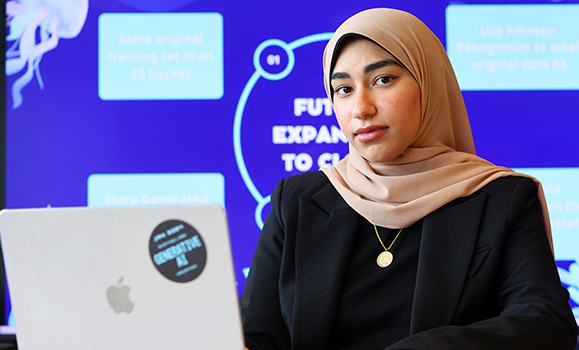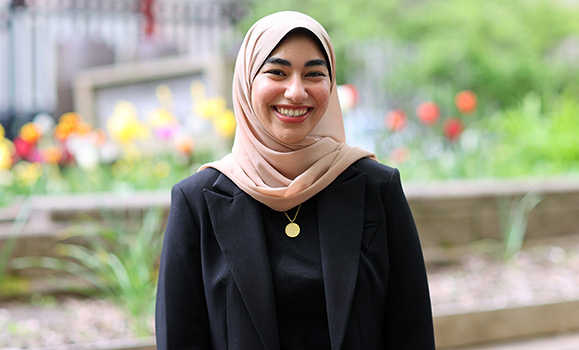This article is part of a series focusing on the grads of the HÂţ» Class of 2024. Spring Convocation runs from May 21 to 31 in Halifax and Truro. Read all our profiles here in one place as they are published, and for more information visit the Convocation website.
You’ve likely been there before: stuck in a moment where you need to make a major life decision but feel overwhelmed by it all.
That’s how Manar Elgamil felt in her last year of high school as she stared down the daunting task of choosing which academic and professional path to pursue.Â
“Honestly, I was really lost when it came to choosing a field,” she says.Â
She recalls being engulfed in a whirlwind of choices, each one carrying the weight of shaping her future — until a clarity began to set in about a path that would give her greater flexibility.Â
“Globally, tech was on the rise, and I knew computer science would provide me with lots of opportunities,” she says.
Once Manar decided on computer science, she didn’t just dip her toes. She dove in headfirst. Today, as she graduates from the Bachelor of Computer Science, she has gone above and beyond to support the Faculty of Computer Science community.
Finding her place
Yet, this journey wasn’t without its obstacles. Â
Manar’s first year was completely online due to the COVID-19 pandemic, forcing her to build a virtual community with her other classmates. Although she didn’t know then, this laid the foundation for her passion in the community.Â
Manar was located in Cairo, Egypt, and found herself as an international student navigating the vast distance between Halifax and her homeland. Feeling extremely disconnected, Manar decided to join an online community for women in tech, the Women in Tech Society (WiTS) and the peer mentorship program. Manar always had a passion for women in STEM and so joining the society and finding a female mentor felt like a natural fit for her.Â
“Everything was online and I wasn't in Halifax, I couldn't even form an idea of Canada. The Women in Tech Society made me more involved and prepared me for what to expect on campus.”Â

Once Manar landed in Halifax, her passion for women in STEM grew even greater. She deepened her commitment to WiTS, first as vice president and then as president in her last year.Â
Taking on leadership roles meant so much for Manar, who admired Zaaheda Islam, one of the group's previous presidents, and considered her a role model. Prior to becoming the WiTS President, Manar completed a co-op placement at Axis Capital, where she had the privilege of working alongside Zaaheda.Â
Read more about Zaaheda’s journey.
“I always looked up to Zaaheda, she was always so supportive and following in her footsteps means so much to me, I consider her a role model,” she says. Â
Shifting perspectives
Leading a student society while juggling other roles and responsibilities wasn’t easy, but Manar says she wouldn’t change it for the world.Â
One of her biggest accomplishments resulted from her work with WiTS. Earlier this year, in collaboration with the Computer Science Society (CSS), Manar helped prepare the WiTS society for the annual Snowball event.Â
“I’m really proud of being a part of the hosting team for the snowball event,” she says. “I was the MC for the evening and there were people from industry, other Faculties, and students there. It was a huge event and I’ll always consider it a great accomplishment.”
Manar's journey has truly come full circle, from merely dreaming of following in Zaaheda's footsteps to stepping into the role as the President of WiTS. Her academic journey has led her to this remarkable moment of realizing all her accomplishments during her time with the Faculty.Â
Even as she graduates, Manar remains committed to advancing women in STEM beyond the classroom. Her mission is to promote inclusivity in a traditionally male-dominated field.Â
“Computer Science is a male dominated industry, but we’re not aiming to exclude men,” she explains. “It's more about making a perspective shift of how men can help and make women and non-binary students feel included — making a more inclusive environment in computer science.”


